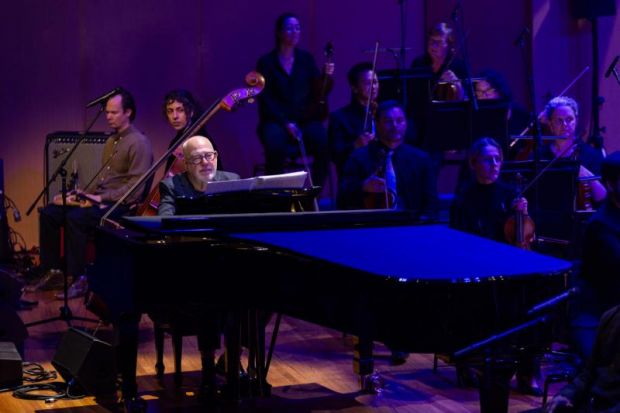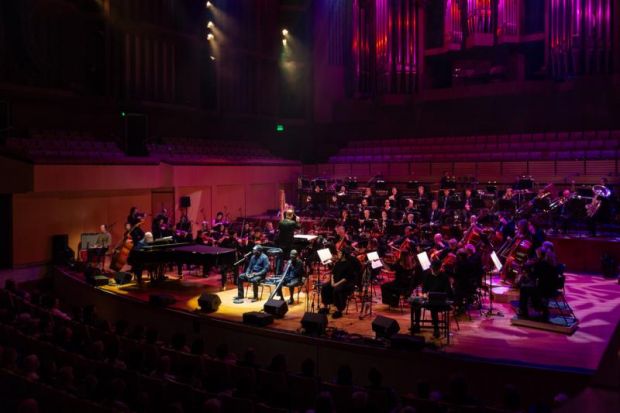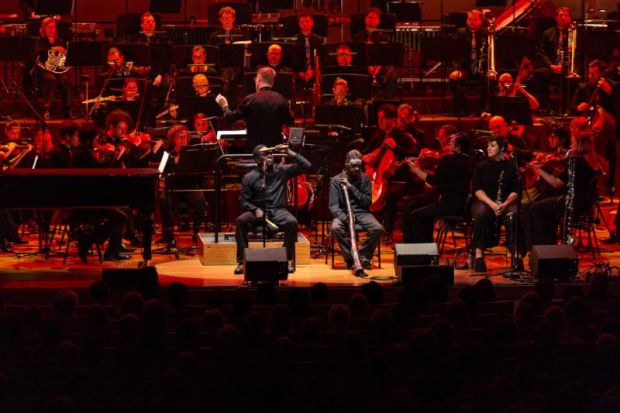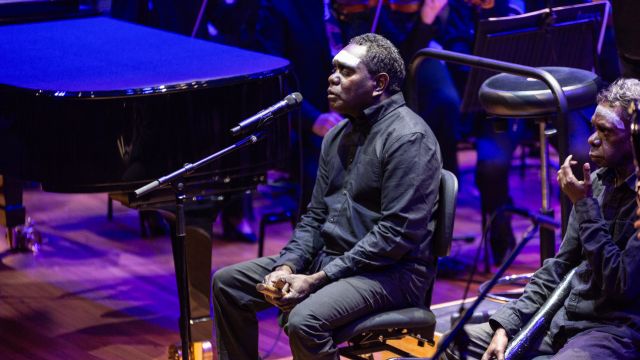Wata
At once ceremonial and surprising, ancient and avant-garde, from the first breath of yidaki to the final hush of wind, Wata carried the audience at QPAC on a transformative journey for the spirit. Composed by Paul Grabowsky in collaboration with Yolngu songmen Daniel Ngukurr Boy Wilfred and David Yipininy Wilfred, this powerful work gathered the elemental forces of sound and story into a musical cycle that was less like a traditional concert and more like a ritual of deep listening.

Drawing from the manikay song traditions of South East Arnhem Land, Wata means wind, but also purification, release, and invocation. Across seven movements, it traced the path of Djuwalpada, a creator spirit who walks the land, names it, dances it into being, and finally takes flight as the lap-winged plover. The work pulsed with this mythic resonance, rendered both reverent and immediate through the fusion of orchestral score, improvisation, and traditional song.
The Queensland Symphony Orchestra, conducted with measured clarity by Benjamin Northey, provided a textured backdrop, at times simmering, at times surging, against which the improvising soloists flickered like firelight. Grabowsky’s own contributions on piano anchored and expanded the sonic landscape, while Erkki Veltheim’s electric violin and Helen Svoboda’s double bass layered tension and shimmer. Aviva Endean’s use of clarinet and Japanese overtone flute added breath and hush, while Peter Knight’s trumpet and electronics summoned echoes from other realms. I particularly enjoyed hearing the instruments mimic the sounds of the bush and its inhabitants.

But it was the presence of Daniel and David Wilfred that made Wata something extraordinary. Daniel’s vocals were raw, unwavering, and expressive. His bilma (clapsticks) cracked the air with authority. David’s yidaki (didgeridoo) playing rumbled through the hall like the voice of the earth itself. Together, they didn’t simply participate in the composition; they drew the entire ensemble into the living body of the manikay. Rather than a collaboration across cultures, this felt like a dissolution of boundaries and an act of musical and spiritual integration.
There was a striking unpredictability to the experience. Each movement bled into the next through improvised passages, defying conventional symphonic structure and instead echoing the soul of land and ceremony. The improvisations never felt ornamental. They were essential breaths between songs, shifting the emotional terrain while remaining tethered to the core purpose of the work.

Visually, the stage was packed with orchestra and improvising musicians, with the commanding Concert Hall pipe organ as the backdrop, majestically lit throughout. The ritual gestures of the Wilfreds stood in contrast to the poised precision of the orchestra, yet by the end, those distinctions blurred. We were not watching a fusion; we were witnessing a collective becoming.
Wata was not an easy piece to categorise, and that’s its power. It asked us for openness, attention, and surrender. It invited the audience into a shared space of cultural and sonic exchange and it moved me profoundly. I could feel the deep connection to Country vibrating through every note, every silence. This was music as more than entertainment, ideal for those hungry for art with meaning. Wata was a gust of wind that stirred the soul, a magical fusion of musical forms, and well deserving of its standing ovation.
Kitty Goodall
Photography by Sasha Parlett
Subscribe to our E-Newsletter, buy our latest print edition or find a Performing Arts book at Book Nook.

